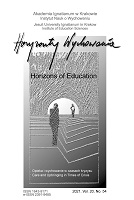Trzy horyzonty znaczeniowe „edukacji dla bezpieczeństwa”
The three semantic horizons of “education for safety”
Author(s): Marcin RojekSubject(s): Education, Pedagogy
Published by: Uniwersytet Ignatianum w Krakowie
Keywords: education for safety; safety; education;
Summary/Abstract: RESEARCH OBJECTIVE: The aim of the article is to establish the meaning of the more and more frequently used construct – “education for safety”, to which intuitive meanings and temporary meanings are assigned, depending on the context of use and being included in a given frame of reference. “Education for safety” can mean anything, causing a troublesome ambiguity or nothing, which limits the possibility of understanding its within the circles concerned. THE RESEARCH PROBLEM AND METHODS: The main research problem is contained in the question: What is “education for safety” in contemporary pedagogy? The research method is the analysis the subject literature, legal acts and the activities of the Education for Safety Association of the Polish Academy of Sciences. THE PROCESS OF ARGUMENTATION: Based on the analysis, three semantic horizons (preconceptualization) of “education for safety” were distinguished and characterised. RESEARCH RESULTS: The analysis shows that “education for safety” can now be understood in pedagogy as: (1) lifelong educational practice, (2) school subject and (3) research subject. The semantic horizons are also possible conceptualisations of “education for safety” in the future. CONCLUSIONS, INNOVATIONS, AND RECOMMENDATIONS: The coexistence of the preconceptualizations indicated here favours their mutual interactions supporting further development, which leads to the emergence of a new subdiscipline – pedagogy of safety. Safety is under dynamic changes and does not have a constant level of organization, therefore “education for safety” should be treated as a lifelong process, a component of the idea of life long learning. In “education for safety” as a school subject, the content of civil safety dominates, and this subject is treated as secondary in schools. In the pedagogical discourse, “education for security” more and more often replaces “education for peace”.
Journal: Horyzonty Wychowania
- Issue Year: 20/2021
- Issue No: 54
- Page Range: 97-109
- Page Count: 13
- Language: Polish

